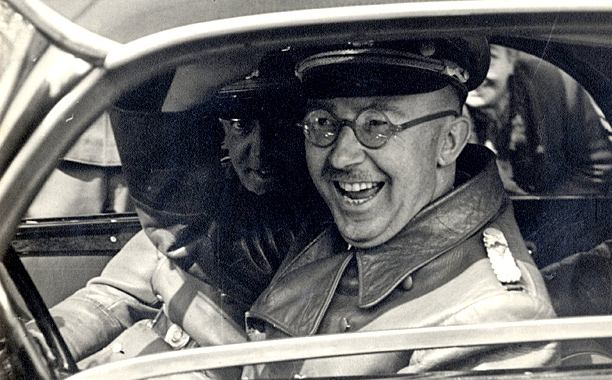THE DECENT ONE (Der Anständige)
Kino Lorber Films
Reviewed for Shockya by Harvey Karten. Data-based on Rotten Tomatoes
Grade: A-
Director: Vanessa Lapa
Screenplay: Vanessa Lapa, Ori Weisbrod
Cast: Tobias Moretti, Sophie Rois, Antonia Moretti, Lotte Ledl, Florentin Groll, Pauline Knof, Lenz Moretti
Screened at: Review 1, NYC, 8/19/14
Opens: October 1, 2014
“The Decent One” took first prize at the Jerusalem Film Festival for Best Documentary, deservedly so. If any organization offered a gold medal for the film with the most ironic title of the year, this one would win hands down. “Der Anständige,” as it’s called in German, is about Heinrich Himmler, a man who should inspire loathing in the minds and hearts of all who know anything about history. One of the greatest mass murderers of the 20th Century, Himmler nonetheless went to his suicidal death thinking that he was doing God’s work, and that “decency,” to him, would be the year’s understatement.
Director Vanessa Lapa, the Belgian-born documentarian who has lived in Israel since 1995, is well known in some circles for helming “Olmert—Concealed Documentary,” a cinema vérite about one of Israel’s recent prime ministers Ehud Olmert and also for being on the production side of “Straddling the Fence,”a 2003 doc directed by New York Times columnist Thomas Friedman. For “The Decent One,” Lapa was blessed with some of the most fantastic archival clips imaginable about the dark days of Nazi rule in Germany. It’s likely that you’ve seen not a single frame of documentation culled from several sources, including hundreds of letters and photos found in Himmler’s home after it was occupied by Americans and other celluloid in places like the Ghetto Fighters House–which is located in Israel’s Kibbutz Givat Hashlosha, where I had the privilege to participate decades ago in a summer Holocaust seminar for high-school teachers.
Given the Germans’ love for detail and perhaps reluctance to shred documents even when their war was lost, Vanessa Lapa is able to set up a mostly epistolary film from the contents of Himmler’s home and to have actors read letter after letter, each epistle backed up by remarkable archival film. Heinrich Himmler directed the mass extermination of six million Jews, tens of thousands of homosexuals and communists, even up to 500,000 Romani. Yet he writes to his daughter in 1941, “In life, one must always be decent, courageous and kind-hearted.” A more accurate depiction of this chicken farmer raised to almost the highest level in the Nazi SS is: “The best political weapon is the weapon of terror. Cruelty demands respect. Men may hate us, but we don’t ask for their love; only for their fear and their submission.” Will the real Heinrich Himmler stand up? Never mind. We know which quote is the more accurate.
With stunning editing by Sharon Brook and Noam Amit and an appropriate score by Jonathan Sheffer, Daniel Salomon and Gil Feldman, Lapa takes us in strict chronology (thank goodness: no artificial melodrama with back-tracking to find its roots) from Himmler’s birth at a little over seven pounds—his mother commenting that he is lively and always hungry. How cute.
As a farmer he appropriately studied agronomy in college, joining the Nazi Party in 1923 and the SS in 1925. Appointed in 1919 Reichsführer by Hitler, he grew the organization from 290 men to a powerful group. He is promoted in 1943 to Chief of German Police and Minister of the Interior, overseeing the Gestapo. It was he who built the extermination camps. On his watch proceeded the liquidation of up to fourteen million people, mostly Polish and Soviet citizens.
If Himmler went to his self-administered death without a modicum of remorse, much is made in the film of his daughter, Gudrun’s regular attempts to whitewash her father’s crimes. She remained a Nazi and kept an image of Himmler as not just a decent one but one of gold. Since 1951 she has been a member of Stille Hilfe, an organization that provides support to arrested condemned or fugitive former SS members.
To the great credit of this documentary, there is nary a moment in which an interviewer sits down with a subject and proceeds to empty that latter’s talking head. The closest we get to that occurs when an actor off stage asks Gudrun questions in English and receives replies in German. Again, the archival film, even more than the exposé of the letters that Himmler writes to his wife (whom he loves despite his taking up with a mistress), makes “The Decent One” a must-see not only for those of us who remain glued to just about everything that comes out of the Holocaust era but those who need to understand that no matter how evil we consider some people to be, the monstrous individuals consider themselves to be decent.
Unrated. 94 minutes. © 2014 by Harvey Karten, Member, New York Film Critics Online
Story – B+
Acting – A-
Technical – A
Overall – A-

